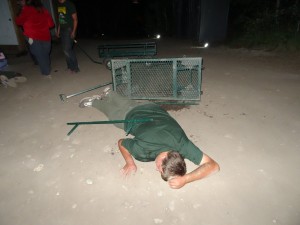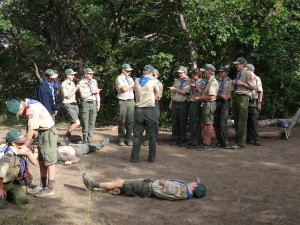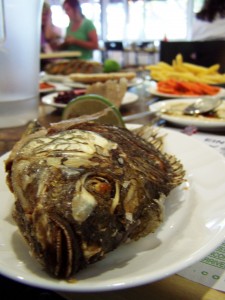I huddled nervously in the dark of the parking lot. The other adult leaders shuffled nearby in the dark as dusk turned to night. Any minute now they would find the victims. First a scream, then some yells, pounding feet and the distant sounds of chaos. Shouts started coming from the more assertive scouts as they gave rapid fire orders to the confused group. Get a blanket, get some water, we need more light. Go get Riley NOW.
And then the thirteen year-old yell, “RILEY! RILEY! WE NEED YOU!”
I knew when I first heard it that I would never stop hearing it.
We stood in our huddled mass listening to the yells and quietly reassuring the other adults. In a few moments we would walk over to the group and reveal the realistic first aid experience we had contrive for our youth. Our two quartermasters were coated in fake skin and blood to give our scouts a taste of what an emergency was like. With the teenagers gathered in our open air dining hall a few started crying, one started singing, several just stared into the dark. Some would go full into on shock; uncontrolled breathing, panicked eyes, irrational thoughts, turning our practice first aid session into a real emergency.
We could never be sure how a child would react to the experience. Maybe they would panic and hyperventilate; maybe they would burst into tears and want to go home. Maybe they would just get very quiet and still, retreating into their inner world as they tried to make room for this new experience. Some would get angry at us for tricking them. They would try to laugh it off and swear revenge on the staff. With my hands on their heads as I tried to calm their sobs I often wondered if the learning experience was worth it.
The youth staff would always push it forward. They had been tricked by it before and they were always anxious and excited to share the experience with fresh eyes. Some said the experience motivated them to study first aid so they might be better prepared the next time it happened. Some would learn a new dislike for blood and turn away from thoughts of nursing or doctoring.
The argument is that this fake emergency gives us a chance to explore our reaction to emergencies. If we know how we react we know what we need to work on. At age 25 I was supposed to be the medical expert at the scout camp but I had no more than the most basic training and little experience. I was terrified all week what would happen if something real happened? What if one of the youth tripped and cracked a head open, could I treat it? Would I freeze in panic? Would I slip into shock? Would I try a treatment but mess it up?
Thankfully I never had to find out but it prompted a review of past emergencies. How do I panic?
I get quiet. I slow down and try to process and observe the situation. I reduce my feelings and think like a robot. What happened? What is the extent of the injuries? What is the cause or the symptom? How do I treat it? Since it’s a slow process someone else will take control as they wait for me to decide what the next action ought to be. I add my two cents here and there and try to lighten the mood. I don’t often take control because by the time I have analyzed the situation fully someone else has command.
I read a study once about trout. Trout are a cold water fish that is highly sensitive to oxygen concentration. There is generally more oxygen in cold water which is why they thrive there. The researchers put some trout in a tank and bubbled nitrogen gas into the water to gradually drive out the oxygen. This meant that the fish began to suffocate. The trout could last a short while once they started to run out of air. They would panic, swim wildly, and die. They did the same experiment with carp. Carp are a lowland fish that thrive in shallow wetland areas where the water is warm and stagnant. They could survive much lower levels of oxygen but they would panic too when they found they couldn’t breathe. Except some fish took it differently. Instead of panicking they would slow down, move less, and try to wait it out. These fish kept their metabolic demand for oxygen low and survived the experiment.
We are not fish. Not every emergency is best dealt with slowly, sometimes if you get still and try to wait out a disaster the bear will just eat you. The question is still worth asking though. How do you respond to panic?




I respond much like you. I worked 17 years doing business disaster recovery. Fortunately a disaster never transpired, but I have attended numerous presentations on human reaction and response in disaster situations. Such situations boggle the mind with so much data outside the scope of previous experience or emotion that the brain does not know how to react or process the information. The response is varied individual by individual though each is caught in the same time and space. Shock, blame, self incrimination, self preservation, preservation of loved ones or everyone, complete shutdown, … Nine months after the Great Eastern Japan Earthquake and Tsunami and through our entire 19 month mission, the minds of hundreds of people in Ishinomaki were still unable to cope. The two sister missionaries in Ishinomaki when the tsunami covered the entire city sprang into action helping everyone. The mission home were out of contact with them and had no access to Ishinomaki and was in a panic . Back to my training, like your scouts, those who train and practice disaster scenarios and who look outside themselves to serve others rise to the occasion.